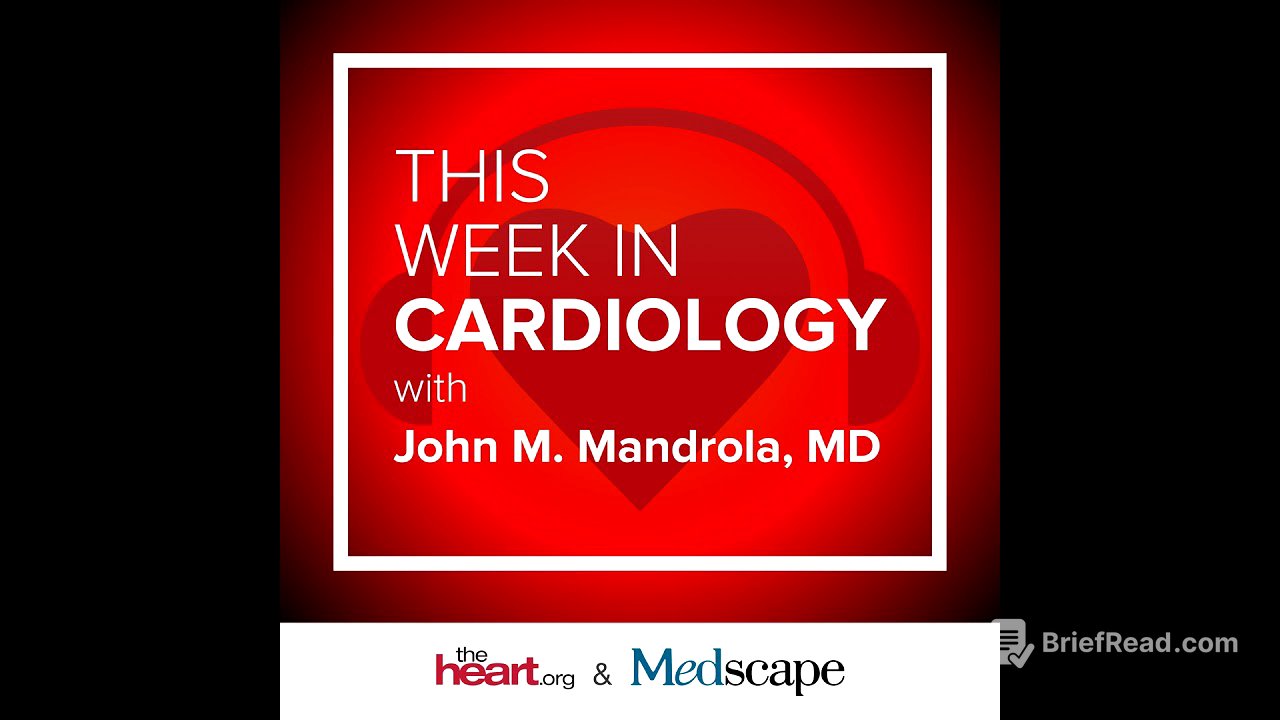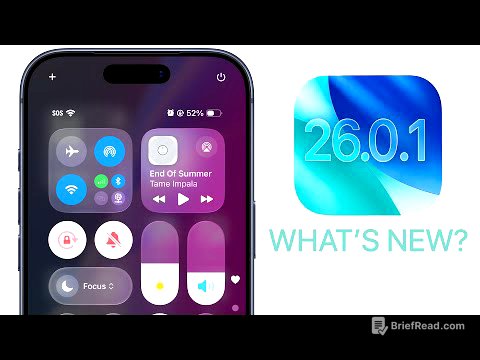TLDR;
This podcast episode covers a range of cardiology topics, including listener feedback on heart failure treatment, a comparison of CRT and conduction system pacing, the significance of fragmented QRS complexes on ECGs, the interpretation of the Abyss trial on beta-blocker interruption after MI, novel approaches to LDL cholesterol lowering, and ICD decisions in cardiac sarcoidosis. The episode emphasizes the importance of individualized treatment strategies, careful interpretation of clinical trials, and consideration of both benefits and risks in clinical decision-making.
- Listener feedback supports aggressive heart failure treatment programs with administrative support and advanced practice clinicians.
- The concise CRT trial comparing conduction system pacing (CSP) with biventricular (BV) pacing had limitations due to small sample size and crossover.
- Fragmented QRS complexes on ECGs can be a clue to underlying structural heart disease and increased risk of arrhythmic events.
- The Abyss trial on beta-blocker interruption after MI was misinterpreted due to a flawed endpoint (CV hospitalization).
- Novel oral PCSK9 inhibitors and CRISPR-mediated gene editing show promise for LDL cholesterol lowering.
- CMR phenotyping may improve ICD decision-making in cardiac sarcoidosis.
Listener Feedback on Heart Failure Treatment [0:44]
Dr. Steve Dixon from Kansas City supports rapid titration of guideline-directed medical therapy (GDMT) in heart failure, noting that hospitalists, PCPs, and advanced practice practitioners are becoming more comfortable with these medications. In his clinic, they use a four-week, four-medication program for patients with heart failure with reduced ejection fraction (HFrEF), mainly through nurse practitioners. This aggressive program has reduced readmission rates. The speaker supports such programs, emphasizing the need for administrative support, champions, and incentives, and highlighting the value of advanced practice clinicians in heart failure care.
CRT vs. CSP: The Concise CRT Trial [2:33]
The concise CRT trial compared conduction system pacing (CSP) with biventricular (BV) pacing in CRT-eligible patients. This Spanish RCT included 134 patients and aimed to demonstrate non-inferiority of CSP. The primary endpoint was a composite of death, transplant, heart failure hospitalization, or failure of left ventricular ejection fraction to improve by more than 5%. The trial found that 18 of 67 patients crossed over from CSP to BV pacing. The primary outcome event occurred in 23.9% of the CSP group versus 29.8% of the BV pacing group, an absolute risk difference of -5.9%. The investigators claimed non-inferiority with a p-value of 0.02. Secondary endpoints favored CSP, including QRS narrowing, echo response, and New York Heart Association functional class improvement. The author argues that the trial was underpowered and had a high crossover rate, making it difficult to detect a true difference between the two pacing strategies.
Clues on the ECG: Fragmented QRS Complex [8:49]
A UCSF group reported a research letter in Circulation EP journal on the association between a fragmented QRS and myocardial fibrosis burden and autopsy-defined arrhythmic causes of presumed sudden cardiac death. The study defined a fragmented QRS as greater than one notch for QRS durations less than 120 milliseconds and greater than two notches for QRS durations greater than 120 milliseconds, present in two leads. Presumed sudden cardiac death with a fragmented QRS was more likely to have arrhythmic causes compared to those without (76% vs. 55%). Coronary disease was the most common cause of a fragmented QRS. Fragmented QRS was associated with higher mean total and replacement fibrosis, as well as more interstitial fibrosis. The author emphasizes the importance of studying the QRS complex in patients with syncope or near-syncope, as it can indicate disordered ventricular conduction due to scar, setting the stage for re-entry and ventricular arrhythmias.
Beta Blockers After MI: The Abyss Trial [13:10]
The Abyss trial compared interruption of beta-blocker therapy to continuation in patients who had a previous MI and an EF greater than 40%. The trial found that interruption was inferior to continuation, driven by hospitalization for cardiac reasons. A European Heart Journal sub-study showed that beta-blocker interruption led to a sustained increase in heart rate and blood pressure. The author argues that the Abyss trial's finding of harm is flawed because the main trial chose a flawed endpoint (CV hospitalization). The author suggests that beta-blockers can be stopped in patients with a history of MI if they have a normal EF and no other reason to take beta-blockers, supported by data from the reduced AMI trial and observational data from Denmark.
Novel Approaches to LDL Cholesterol Lowering [21:04]
A phase 2 dose-ranging study published in JACC investigated an oral PCSK9 inhibitor called funnally a ZD0780. The drug achieved a dose-dependent drop in LDL cholesterol, with the maximum dose of 30 mg achieving a 50% placebo-adjusted reduction in LDL cholesterol in patients on statins with LDL cholesterol greater than 70 mg/dL. The author notes that pills are better than shots due to increased patient convenience. The editorialist also discussed the pricing dilemma and the role that pharmacy benefit managers will have. Verve is working on permanent inhibition of the PCSK9 complex via CRISPR-mediated gene editing, a one-and-done approach to LDL cholesterol management.
ICD Decisions in Cardiac Sarcoidosis [24:02]
A study in the European Heart Journal proposed a CMR phenotyping method for risk stratification in patients with cardiac sarcoidosis. The authors dichotomized CMR phenotypes into high risk (pathology frequent LG) and low risk (other three groups). The CMR dichotomized method had the best area under the curve for VT events at five years. The author notes that ICDs are never an insurance policy and should be deployed in patients with a high risk of ventricular arrhythmia and a low risk of competing risks. The 54-year-old patient with heart block and LG and reduced EF from cardiac sarcoidosis seems like an ideal patient for an ICD.









